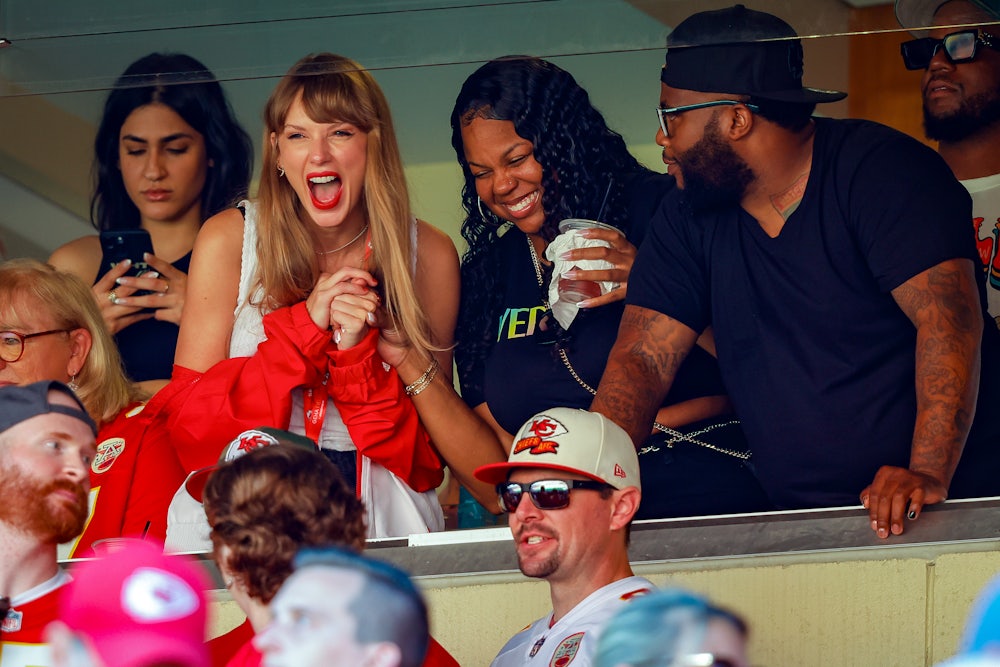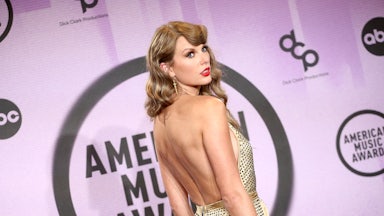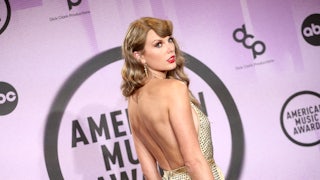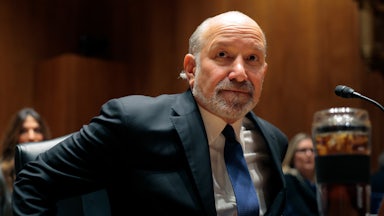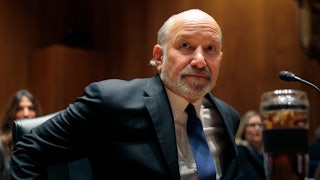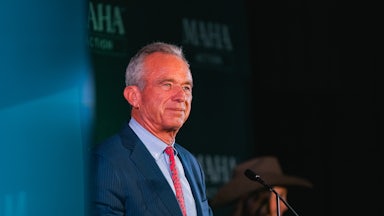Conservatives have this thing where they get older but never wiser. It was on full display after the most terminally online among them lost their marbles amid the Taylor Swift discourse that hit a fever pitch this past weekend, when a social media firestorm kicked off because Swift went to a football game. As with all things Swift, this rattled the firmament of fandom, but for various figures on the right, the whole uproar seemed to touch off a simmering mess of male conservative insecurity.
Here’s what went down: On Sunday, Swift attended the Kansas City Chiefs game against the Chicago Bears at Arrowhead Stadium in Kansas City. Swift had previously been rumored to be in the early stages of a relationship with Travis Kelce, the Chiefs tight end—and one of the team’s best-known stars. Coincidentally, Kelce had recently drawn the ire of Republicans for doing something that’s not even remotely controversial in normal circles: He posted an ad for Pfizer to his Instagram account on Saturday, encouraging people to get their Covid-19 booster shots.
As Swift watched the game from a private box along with Kelce’s mother, millions of viewers tuned in to watch—and it was hard to dismiss the possibility that her mere presence might be contributing to a sudden surge of interest. Despite the fact that the game was a 41–10 blowout, a stunning 24.3 million viewers watched from home, making it the most watched game this week on any network. Eventually, Fox switched away from the Kansas City game to a more competitive matchup between the Dallas Cowboys and the Arizona Cardinals. It’s unclear if the switch was made because the Chicago Bears were just objectively more pitiful to witness or if Swift was becoming some kind of distraction, but either way, Fox made the decision to pass on a huge influx of viewership.
But the Swift-borne cultural froth continued to fizz long after the game ended. Throughout Sunday night and into the beginning of the week, X (the site formerly known as Twitter) erupted in excitement over the superstar sighting, but it wasn’t only Taylor’s fans who were weighing in. Conservatives, already aggrieved over Kelce, quickly merged into the mob of people discussing Swift—and they brought their own limply misogynist takes with them.
Some, like right-wing activist Charlie Kirk, speculated that Swift would do damage to Kelce, the same way he imagines a booster shot might.
What will break Kelce’s heart first?
— Charlie Kirk (@charliekirk11) September 24, 2023
The COVID shot or Taylor Swift?
🤔
Others, like the surprisingly still-around Tomi Lahren, wondered if Taylor Swift was to blame for Kelce’s socially responsible ad in the first place.
Is this what happens when you date Taylor Swift? https://t.co/PIspvXNUc5
— Tomi Lahren (@TomiLahren) September 23, 2023
Conservative commentator Roger Kimball also weighed in to comment on her appearance, a favorite of Swift critics with nothing to say:
Also, she is homely. https://t.co/FIiTK9N7cB
— Roger Kimball (@rogerkimball) September 25, 2023
Kelce’s support for Covid vaccines seemed to add catalyst to this outrage cycle. White nationalist and antisemitic Rumble host Stew Peters went so far as to run a segment calling for Swift and Kelce’s execution, on the grounds that Kelce’s Pfizer ad was “leading people to their slaughter.” Part of Peters’s shtick is to call for the killings of his perceived enemies—pretty sick stuff that you might have never heard about had he not added the woman who wrote “All Too Well (10 Minute Version)” to his hit list.
Swift is no stranger to conservative backlash, though there are countless celebrities who spend more effort specifically courting it. While political activism is part of her curated aesthetic, she hasn’t made any discernibly partisan political moves in quite a while. She isn’t well known for throwing sharp elbows, either; her quietness on the political issues of the day often brings disappointment to her fans.
But on those rare occasions when she does weigh in, it usually isn’t to the benefit of Republicans. In 2018, Swift broke her silence on politics to criticize then-Tennessee Representative Marsha Blackburn. In an Instagram post, she said that Blackburn’s voting record “appalled and terrified” her. In 2019 she condemned former President Donald Trump, calling him a wannabe “autocrat.” She also went after him over a tweet he posted in the wake of the George Floyd protests. She has also spoken out in favor of LGBTQ+ rights and incorporated that issue into the material of her album Lover. “Shade never made anybody less gay,” she sang in her single “You Need to Calm Down”—in which she rather controversially compared her experience as a famous person to the persecution faced by queer people.
Nevertheless, it’s hard to fathom that these occasional forays into partisan scrapping are the driving force behind the increasing animus of conservatives. So what is it about her that has triggered such intense vitriol? It’s less about the content of her political worldview and more about her vast, earth-moving popularity, the likes of which can seemingly convince people to spend their Sunday watching the Chicago Bears get trounced.
There have been other recent demonstrations of this power that likely gave conservatives greater cause to grouse—and perhaps worry. Last week, on National Voter Registration Day, Swift posted on Instagram encouraging young people to register to vote. As a result, over 35,000 people did so, contributing to a 23 percent increase in overall registrations compared to those who registered on the same day last year. That included a 115 percent increase in 18-year-olds registering to vote. Swift’s call for her fans to register to vote was distinctly nonpartisan, but it’s the youngest voting cohort that’s demonstrated the sharpest opposition to Republicans at the polls in recent elections—so much so that conservatives have increasingly called for the voting age to be raised and for polling places to be removed from college campuses.
In addition to broad fears about the world that young people may want to create, for many conservatives their antipathy for Swift nestles in old-fashioned male insecurity. Amid the flurry of the Taylor-Kelce Twitter storm, an article published in The Federalist earlier this month has quietly recirculated, arguing that Swift’s fame is a sign of “societal decline” because her music appeals to feminists by painting men in an unflattering light. While most of that lengthy piece was given over to vacant denunciations of Swift’s allegedly man-hating lyricism, its author, Mark Hemingway, did accidentally speak to the core of why Republicans get so up in arms when Swift does—well, anything.
“I still stand by the fact it’s a mistake to read too much in the way of politics or feminism into Swift’s appeal,” Hemingway wrote. But before his end of that train of thought rattled off into misogynist dribble, Hemingway actually illustrated something genuinely interesting about how conservatives view Taylor Swift. He argued that Swift’s brand of “self-obsessed” lyricism, which recounts bad breakups, has led to a “chicken-or-egg first proposition” with her fan’s strong feminist lean and her “popularity in the face of this lyrical obsession.”
He’s not the first to notice this idea running through Swift’s lyrics, though others have been more charitable in their description of it. As Michelle Goldberg explained in an op-ed in The New York Times, Taylor Swift caters to a “huge underserved market for entertainment that takes the feelings of women and girls seriously.” To conservatives, this means that Swift is feeding into the reactionary feminist politics of her listeners. Hemingway’s argument is essentially that when women publicly discuss their personal experiences with men, it is the pure product of man-hating and attracts, or even creates, so-called man-hating listeners.
This gets at the root of how conservatives view Swift—it’s a somewhat paradoxical demonstration of political influence, in which Swift reflects the ideas and temperament of her fans while simultaneously demonstrating the ability to conduct her audience along similar lines. It’s not just that Swift is popular, it’s that she seemingly directs and determines the worldview of a large swath of young people, and they, perhaps, influence hers in return.
Swift doesn’t actually act at the urging of her devotees all that often, but conservatives don’t care to make that distinction. The not-so-political Swift is a political lightning rod that could summon power at any time—even at a football game. The Twitter storm launched by Swift’s appearance at the Kansas City Chiefs game gets to the heart of why she is like catnip to conservatives looking to complain. It’s not because she is rich, famous, and beautiful—it’s because of her vast influence over a younger demographic that conservatives have famously struggled to attract or exert an influence upon themselves.
Sunday’s Kansas City game ranked first among the rest of that week’s slate of games in terms of viewership among women between the ages of 12 and 49, and sales for Travis Kelce jerseys jumped an astonishing 400 percent. On Twitter, users began joking that merely by being photographed with something, she has the ability to make it popular, not to mention the endless speculation that her relationship with Kelce is a coordinated public relations stunt. Articles have sprung up reporting that Swift’s fans are asking her to do something to stop the Chiefs’ controversial “tomahawk chop,” and conservatives are already whining that Swift should keep her woke fans far away from football. Where Taylor goes, however, the Swifties are sure to follow.
On Wednesday night, MSNBC’s Ari Melber did a segment on his show The Beat about this week’s Taylor Swift backlash. To Melber’s mind, the Taylor Swift fan base “scares certain people on the right, who see its power, see its movement, see its civic reach.” Melber went on to assert that Republicans focus on Swift because of the “bundle of issues she has come to represent,” including “authentic emotional passion,” “outspoken feminism,” and “a willingness to clash with stereotypes and corporate systems.”
“They’re afraid of the power,” Melber said. Perhaps they should be. If Swift can make a bunch of her female fans watch a uniquely boring football game, what can’t she do?
